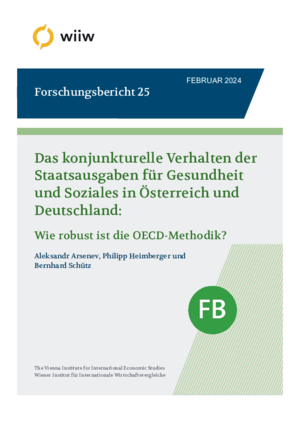Das konjunkturelle Verhalten der Staatsausgaben für Gesundheit und Soziales in Österreich und Deutschland: Wie robust ist die OECD-Methodik?
Aleksandr Arsenev, Philipp Heimberger and Bernhard Schütz
wiiw Research Report in German language No. 25, February 2024
30 pages including 7 Tables and 4 Figures
Das konjunkturelle Verhalten der Staatsausgaben für Gesundheit und Soziales in Österreich und Deutschland: Wie robust ist die OECD-Methodik?
This publication is available in German language only.
For a brief English summary see further below.
Ausgabenelastizitäten messen die Reaktion der verschiedenen Komponenten der Staatsausgaben auf den Konjunkturzyklus. Sie sind wichtige Inputs für fiskalische Prognosen und sind im Kontext der Fiskalregeln relevant, da Elastizitätsschätzungen in die Bestimmung des fiskalischen Spielraums einfließen. In dieser Studie wird die Sensitivität der von der OECD und der Europäischen Kommission verwendeten Schätzmethode zur Ermittlung der Elastizitäten der Staatsausgaben für Österreich und Deutschland für den Zeitraum 1995-2020 analysiert. Unsere Ergebnisse deuten darauf hin, dass die Ausgabenelastizitäten auf kleine Abweichungen bei den Daten und der Modellspezifikation reagieren. Weiters finden wir, dass die Sozialausgaben in Österreich und Deutschland auf Konjunkturschwankungen reagieren, dieser Effekt aber stark von den Ausgaben für Arbeitslosigkeit getrieben wird.
The Cyclical Behaviour of Government Spending on Health and Social Welfare in Austria and Germany: How Robust is the OECD Methodology?
Expenditure elasticities measure the reaction of the various components of government spending to the economic cycle. They are important inputs for fiscal forecasts and are relevant in the context of fiscal rules, as elasticity estimates are included in the determination of fiscal space. This study analyses the sensitivity of the estimation method used by the OECD and the European Commission to determine the elasticities of government expenditure for Austria and Germany for the period 1995-2020. Our results suggest that the expenditure elasticities are sensitive to small deviations in the data and the model specification. Furthermore, we find that social expenditure in Austria and Germany is sensitive to economic fluctuations, but that this effect is strongly driven by unemployment expenditure.
Keywords: Staatsverschuldung, Haushaltsdefizit, Haushaltsregeln, Haushaltselastizität, Staatsausgaben, Sozialausgaben
JEL classification: E62, H62, E32
Countries covered: Austria, Germany
Research Areas: Macroeconomic Analysis and Policy
